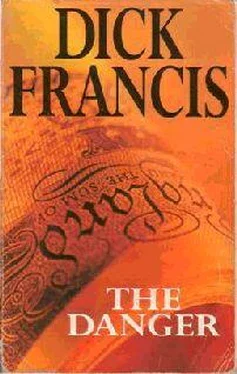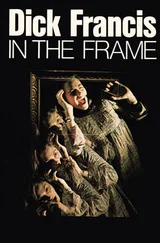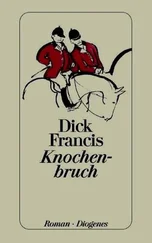'Pretty miserable for you,' I said.
'Mm.' She half smiled. 'It's incredible… but I got used to it. One wouldn't think one could. But it was one's own smell, after all… and after the first few days I hardly noticed it. She paused again. 'Those first days I thought I'd go mad. Not just from anxiety and guilt and fury… but from boredom. Hour after hour of nothing but that damned music… no one to talk to, nothing to see… I tried exercises, but day after day I grew less fit and more dopey, and after maybe two or three weeks I just stopped. The days seemed to run into each other, then. I just lay on the foam mattress and let the music wash in and out, and I thought about things that had happened in my life, but they seemed far away and hardly real. Reality was the bucket and pasta and a polystyrene cup of water twice a day… and hoping that the man with the microphone would think I was behaving well… and like me.'
'Mm,' I said. 'He liked you.'
'Why do you think so?' she asked, and I saw that curiously
she seemed glad at the idea, that she still wanted her kidnapper to approve of her, even though she was free.
'I think,' I said, 'that if you and he had felt hate for each other he wouldn't have risked the second ransom. He would have been very much inclined to cut his losses. I'd guess he couldn't face the thought of killing you… because he liked you.' I saw the deep smile in her eyes and decided to straighten things up in her perspective. No good would come of her falling in love with her captor in fantasy or in retrospect. 'Mind you,' I said, 'he gave your father an appalling time and stole nearly a million pounds from your family. We may thank God he liked you, but it doesn't make him an angel.'
'Oh…' She made a frustrated, very Italian gesture with her hands. 'Why are you always so… so sensible?'
'Scottish ancestors,' I said. 'The dour sort, not the firebrands. They seem to take over and spoil the fun when the quarter of me that's Spanish aches for flamenco.'
She put her head on one side, half laughing. 'That's the most I've ever heard you say about yourself.'
'Stick around,' I said.
'I don't suppose you'll believe it,' she said, sighing deeply and stretching her limbs to relax them, 'but I am after all beginning to feel fairly sane.'
July crept out in a drizzle and August swept in with a storm in a week of little activity in the London office but a good deal in Italy.
Pucinelli telephoned twice to report no progress and a third time, ecstatically, to say that Cenci's offer of a reward had borne results. The offer, along with the kidnappers' pictures, had been posted in every possible public place throughout Bologna and the whole province around; and an anonymous woman had telephoned to Paolo Cenci himself to say she knew where a part of the ransom could be found.
'Signor Cenci said she sounded spiteful. A woman scorned. She told him it would serve "him" right to lose his money. She wouldn't say who "he" was. In any case, tomorrow Signor Cenci and I go to where she says the money can be found, and if she is right, Signor Cenci will post a reward to her. The address to send the reward is a small hotel, not high class. Perhaps we will be able to find the woman and question her.'
On the following evening he sounded more moderately elated.
'It was true we found some of the money,' he said. 'But unfortunately not very much, when you think of the whole amount.'
'How much?' I asked.
'Fifty million lire."
'That's… er…' I did rapid sums, 'nearly twenty-five thousand pounds. Hm… The loot of a gang member, not a principal, wouldn't you say?'
'I agree.'
'Where did you find it?' I asked.
'In a luggage locker at the railway station. The woman told Signor Cenci the number of the locker, but we had no key. We had a specialist to open the lock for us,'
'So whoever left the money thinks it's still there?'
'Yes. It is indeed still there, but we have had the lock altered. If anyone tries to open it, he will have to ask for another key. Then we catch him. We've set a good trap. The money is in a soft travel bag, with a zip. The numbers on the notes match the photographs. There is no doubt it is part of the ransom. Signor Cenci has sent a reward of five million lire and we will try to catch the woman when she collects it. He is disappointed, though, as I am, that we didn't find more.'
'Better than nothing,' I said. 'Tell me how you get on.'
There were two usual ways to deal with 'hot' money, of which the simplest was to park the loot somewhere safe until the fiercest phase of investigation was over. Crooks estimated the safety margin variously from a month to several years, and were then fairly careful to spend the money far from home, usually on something which could instantly be resold.
The second, more sophisticated method, most used for large amounts, was to sell the hot money to a sort of fence, a professional who would buy it for about two-thirds of its face value, making his profit by floating it in batches onto the unsuspecting public via the operators of casinos, markets, fairgrounds, racecourses or anywhere else where large amounts of cash changed hands quickly. By the time the hot money percolated back to far-flung banks the source of it couldn't be traced.
Some of Paolo Cenci's million quid could have been lopped by a third in such laundering, some could have been split between an unknown number of gang members, and some could have been spent in advance on outgoings, such as renting the suburban house. The expenses of a successful kidnapping were high, the ransom never wholly profit. All the same, despite its risks, it was the fastest way to a fortune yet devised, and in Italy particularly the chances of being detected and caught were approximately five per cent. In a country where no woman could walk in the streets of Rome with a handbag over her arm for fear of having it razored off by thieves on motorcycles, kidnapping was regarded as a fact of life, like ulcers.
Pucinelli telephoned two days later in a good mood to report that the woman who had collected the reward had been followed home without challenge and had proved to be the wife of a man who had served two terms in jail for raids on liquor stores. Neighbours said the man was known for chasing girls, his wife hot-bloodedly jealous. Pucinelli thought that an arrest and search of the man on suspicion would present no problems, and the next evening reported that the search had revealed the luggage locker ticket in the man's wallet. The man, identified as Giovanni Santo, was now in a cell and pouring out information like lava from a volcano.
"He is stupid,' Pucinelli said disparagingly. 'We've told him he will spend his whole life in jail if he doesn't co-operate, and he's shit scared. He has told us the names of all the kidnappers. There were seven of them altogether. Two we already have, of course, and now Santo. At this minute we have men picking up three others.'
'And Giuseppe?' I asked, as he stopped.
'Giuseppe,' he said reluctantly 'is not one of them. Giuseppe is the seventh. He was the leader. He recruited the others, who were all criminals before. Santo doesn't know Giuseppe's real name, nor where he came from, nor where he's gone. I'm afraid in this instance Santo speaks the truth.'
'You've done marvels,' I said.
He coughed modestly. 'I've been lucky. And Andrew… between us privately I will admit it… it has been most helpful to talk to you. It clears things in my mind to tell them to you. Very odd.'
'Carry right on,' I said.
'Yes. It's a pleasure,' he said; and he telephoned three days later to say they now had all six gang members in custody and had recovered a further hundred million lire of Cenci's money.
'We have also taken recordings of all six men and had voice prints made and analysed, but none of them is the voice on the tapes. And none of them is the man you saw, of whom we have the picture.'
Читать дальше












